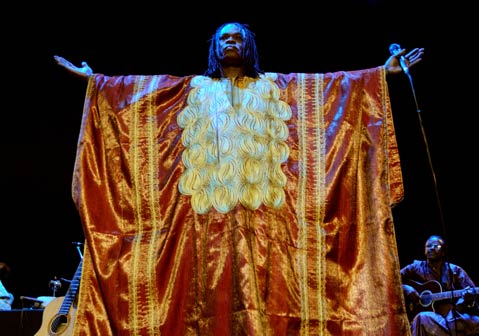Baaba Maal Tours on Album Produced by Brazilian Girls
Senegalese Pop Star Plays UCSB’s Campbell Hall

In the past, there have been cycles of heightened world awareness with regard to African pop music and promises have been made (and broken) regarding Africa spawning “the next Bob Marley.” But for Baaba Maal, who has been on the world stage since 1988, that kind of endorsement is not the point. Maal, who has released more than a dozen albums, has a stellar new one, Television, and seems more interested in reaching the hip kids of Dakar than climbing the Billboard charts. In fact, his never-resting musical curiosity may be the main reason why he appears more likely than anyone else on the African pop scene to make that long-promised worldwide breakthrough a reality. On Sunday, April 18, Maal brings his new sound and a full band to UCSB’s Campbell Hall for a night of potent live dance music. I recently spoke with Maal via telephone from his home in Dakar, Senegal.
Why did you title the new album Television? The album is called Television as a reference to the dominant medium in Africa today. I wanted to use these songs to talk about the best way to inform the people of Africa about the things I care about, and right now television is what gives most Africans the easiest access to information. I was writing in London, but I was consciously thinking about the differential in Africa in terms of technology. Original African television programming—particularly of sports, but on all levels, not just entertainment—has become the most important way for an artist to reach an audience there.
The Brazilian Girls produced and collaborated for this album. What was that like? I loved working with Didi Gutman and Sabina Sciubba of Brazilian Girls on this project. Didi’s a great producer, and I felt like he helped me to realize one of my goals with this recording, which was to make an album as a musician first, rather than as an African musician. Because the Brazilian Girls travel constantly and play in all different countries all over the world, they could relate to my desire to make a truly international sound for the music.
How did it flow in the London studio? I talked with them a lot about music as a lifetime of education, and I brought along some of my favorite musicians from home, such as the talking drum player Massamba Diop, so that even the electronic backing tracks are informed by my background in more traditional music.
What were you trying to do with this new approach? The aim was to make something young and fresh, and I think we achieved that because Senegalese kids love the record. They are really responding to it and to the videos. It surprised them, I think, my collaborating with the Brazilian Girls and using a different, more electronic sound; but once they got used to the idea, they loved the music.
How would you compare the role of music in Senegal to that of music in other countries? The biggest thing about music in Senegal is that it’s always completely alive in the culture. Musical trends are constantly changing, and everyone follows music really closely, so you feel you have to perform well and be innovative at all times.
What defines you as an artist? I’m someone who constantly looks for the next step. I love to put out something different musically, and I love to dance, so those two aspects—innovation and danceability—will always be there with me.
How would you recommend the show to people who have seen you, and the people who have not? To the people who have seen me in the past, I say come back, you won’t be disappointed, and to those who are new to it, I say come and find out what you think of this new kind of African music. I think you will like it.
4•1•1
Baaba Maal performs at UCSB’s Campbell Hall on Sunday, April 18 at 7 p.m. For tickets and information, call 893-3535 or visit artsandlectures.sa.ucsb.edu.



